Nuts are a tasty treat for us humans. We enjoy them by the handful and in salads, cookies, cakes, sauces, and more. Nuts are a great protein source and are loaded with nutrients. But can dogs eat nuts? It’s a question definitely worth exploring and knowing the answer. So let’s delve into which nuts dogs can eat and nuts harmful to dogs.
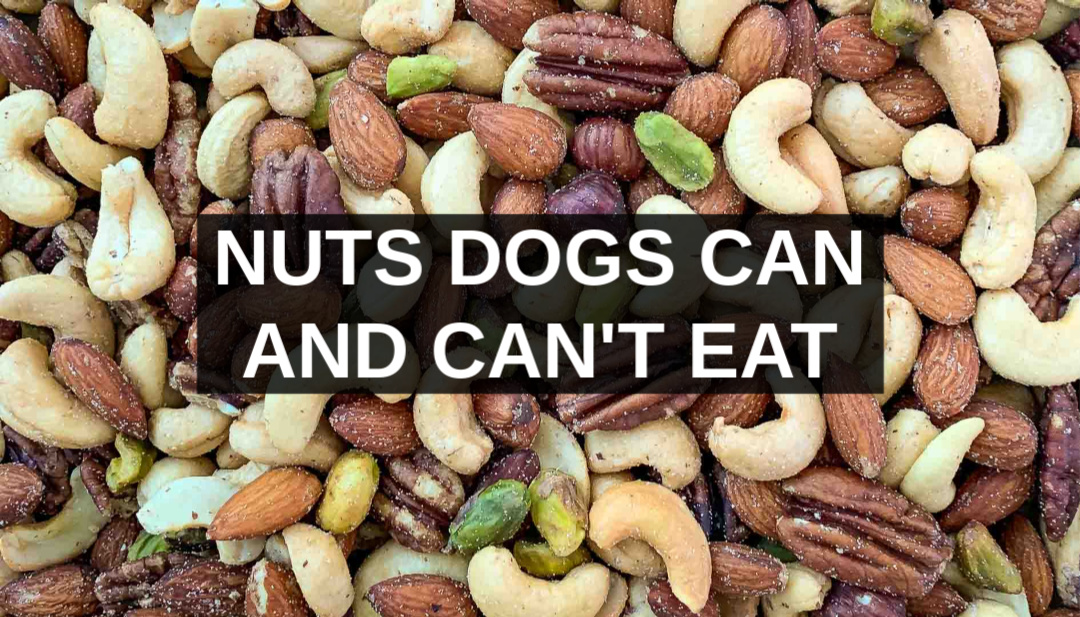
- Are nuts good for dogs?
- Can dogs eat nuts?
- Nuts Dogs Can and Can't Eat – Q&A List
- Can Dogs Eat Acorns?
- Can Dogs Eat Almonds?
- Can Dogs Eat Brazil Nuts?
- Can Dogs Eat Cashews?
- Can Dogs Eat Chestnuts?
- Can Dogs Eat Hazelnuts?
- Can Dogs Eat Hickory Nuts?
- Can Dogs Eat Macadamia Nuts?
- Can Dogs Eat Peanuts?
- Can Dogs Eat Pecans?
- Can Dogs Eat Pine Nuts?
- Can Dogs Eat Pistachios?
- Can Dogs Eat Walnuts?
- Salted, Sugared, and Flavored Nuts
- The Bottom Line on Nuts and Dogs
- Additional Resources:
For ultimate pet safety, I recommend consulting with your vet prior to feeding your dog any food listed in this article.
FYI – This post contains affiliate links. As an Amazon Associate, I earn from qualifying purchases.
Are nuts good for dogs?
Or are nuts bad for dogs? The answer depends on the nut. The safe ones are protein-rich and have essential vitamins. Some nuts are the most toxic foods for dogs. Those particular poisonous nuts can be lethal even in very small amounts.
Nuts are high in fat. This isn’t a good thing for dogs. High-fat foods can cause dogs to have an upset stomach, diarrhea, and pancreatitis.
Nuts are high in calories and can lead to obesity.
Nutshells can tear the tissue of a dog’s digestive system and cause a blockage.
Many store-bought nuts are salted or contain other chemicals which can dehydrate or poison dogs.
Can dogs eat nuts?
Responsible dog owners feed their dog the best food and treats for optimal health and longevity. In general, nuts should not be a regular part of a dog’s diet. An occasional nut treat is fine as long as it is safe and in a small amount.
Want to know what nuts can dogs eat? Keep reading…
Here’s information about each nut and if it is safe or harmful to dogs.
Nuts Dogs Can and Can’t Eat – Q&A List
Can Dogs Eat Acorns?
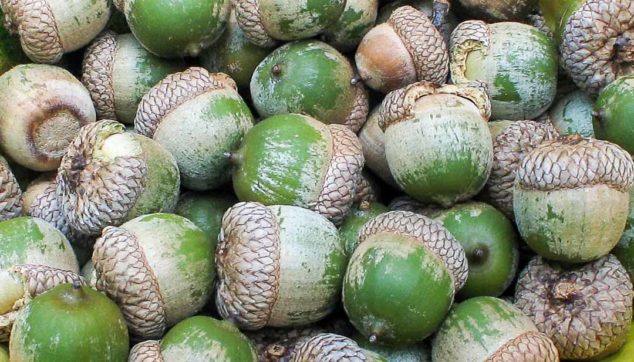
Acorns can be toxic to dogs. Acorns can cause mild to moderate gastrointestinal upset including bloating, vomiting, diarrhea, and general discomfort.
Acorns contain gallotanins, a combination of gallic acid and tannic acid which can cause stomach upset, diarrhea, and kidney disease. In some cases, acorn ingestion can cause abdominal obstruction and internal damage. Water that has been exposed to acorns can also be harmful.
Read more about dogs eating acorns.
Can Dogs Eat Almonds?
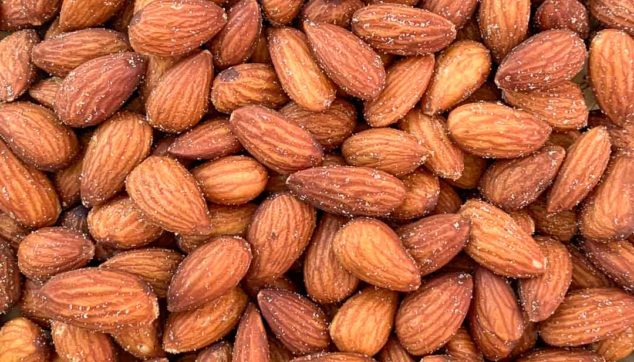
Almonds are not toxic however they are not easily digested can give your dog an upset stomach, create gastric intestinal distress, or cause abdominal obstruction.
Almonds are high in fat and can cause your dog to have an upset stomach and pancreatitis.
Are almonds good for dogs? Almonds for dogs are not a wise or healthy choice. Responsible pet owners give the best food to their dogs and almonds are not a good treat.
Can Dogs Have Almond Butter?
Dogs can have small amounts of almond butter. Note almond butter is very high in fat and too much may cause pancreatitis.
Choose all-natural, unsweetened, and unsalted varieties. Make sure it does not contain artificial sweeteners. Look at the ingredients thoroughly.
Xylitol, a sweetener, is highly toxic to dogs and causes severe insulin release when ingested by dogs. Acute poisoning will occur, resulting in two main syndromes: hypoglycemia (life-threateningly low blood sugar) and acute hepatic necrosis (severe liver failure).
Take a look at this homemade almond butter recipe with only almonds and no added salt, sugar, or oil.
Can Dogs Have Almond Milk?
Dogs can have small amounts of unsweetened almond milk. Make sure it is unflavored and does not contain sugar or artificial sweeteners. Look at the ingredients thoroughly.
One sweetener, xylitol, is highly toxic to dogs and causes severe insulin release when ingested by dogs. Acute poisoning will occur, resulting in two main syndromes: hypoglycemia (life-threateningly low blood sugar) and acute hepatic necrosis (severe liver failure).
Related article: Can Dogs Drink Almond Milk on Dog Health Coach
Can Dogs Eat Brazil Nuts?
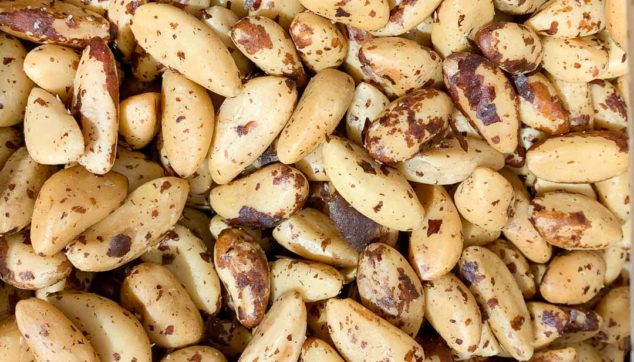
Brazil nuts are not toxic to dogs however they are not easily digested and can cause abdominal obstruction or create gastric intestinal distress.
Brazil nuts are high in fat and can cause your dog to have an upset stomach and pancreatitis.
Can Dogs Eat Cashews?
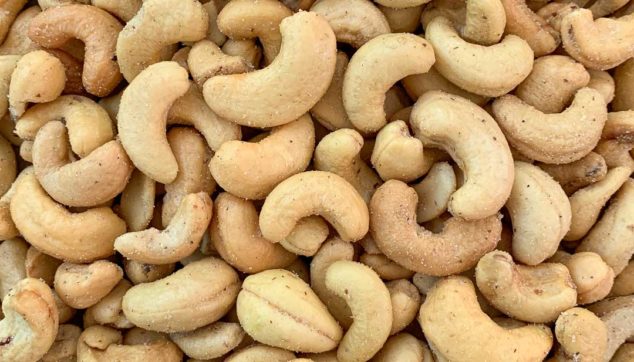
Cashews are safe for dogs. Like all nuts, cashews are high in fat, and too many can cause weight gain and pancreatitis. Just keep in mind that cashews and dogs are not the healthiest combination.
Cashews must be cooked or roasted. Raw cashews are toxic to dogs. The toxin is eliminated with high-temperature cooking.
Can Dogs Eat Chestnuts?
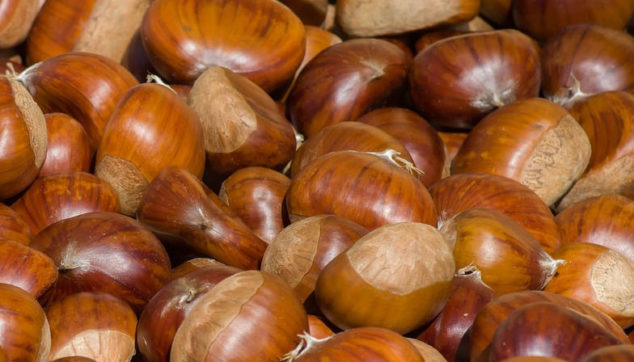
Chestnuts are safe in small amounts. Large portions of chestnuts could lead to severe diarrhea, gastrointestinal distress, or pancreatitis.
Always peel the shell off a chestnut before giving it to your dog. Mash it up and mix it in with your dog’s food. Whole chestnuts pose a choking or obstruction risk.
Horse chestnuts are toxic to dogs. Horse chestnuts can cause vomiting, seizures, and paralysis and can be life-threatening.
Chestnuts are high in fiber and lower in fat than most nuts.
Can Dogs Eat Hazelnuts?
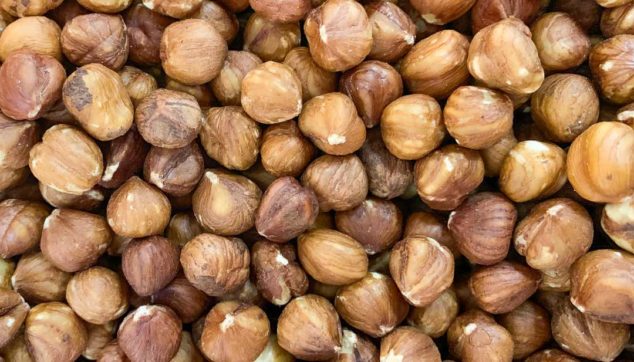
Hazelnuts are not toxic to dogs however they are not easily digested. They can cause bowel obstruction or create gastric intestinal distress.
Hazelnuts pose a choking risk, especially with small dogs.
Hazelnuts are high in fat and can cause your dog to have an upset stomach and pancreatitis.
Can Dogs Eat Hickory Nuts?
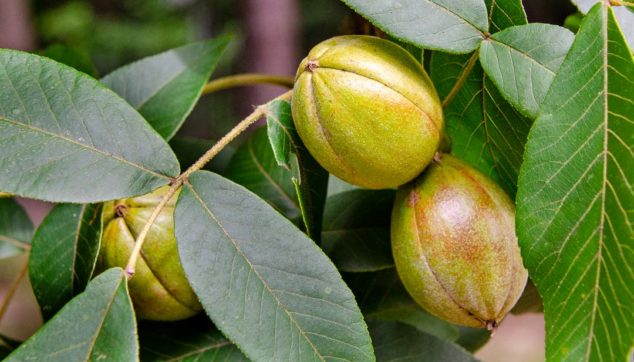
Hickory nuts are harmful to dogs. Hickory nuts contain the toxin juglone which can cause gastric intestinal upset. They may also contain tremorgenic mycotoxins that can cause seizures or other neurological problems.
Hickory nuts can cause an intestinal blockage.
Can Dogs Eat Macadamia Nuts?
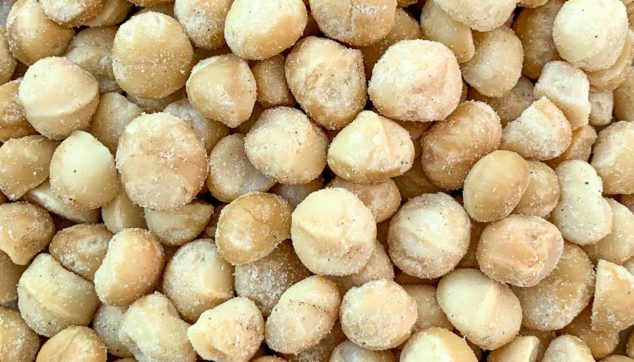
Macadamia nuts are highly toxic to dogs. Just one macadamia nut can seriously harm your dog. Macadamia nuts contain an unknown toxin that can cause neurological symptoms including tremors, dizziness, and even temporary paralysis.
Additionally, macadamia nuts are very high in fat which may cause your dog to have a very upset stomach or pancreatitis.
Macadamia nuts and dogs do not mix. It’s extremely dangerous for your dog to eat macadamias. Never put the nuts in a place within reach of your dog.
What if your dog has eaten macadamia nuts? Get your dog immediately to a veterinarian or pet clinic.
Can Dogs Eat Peanuts?
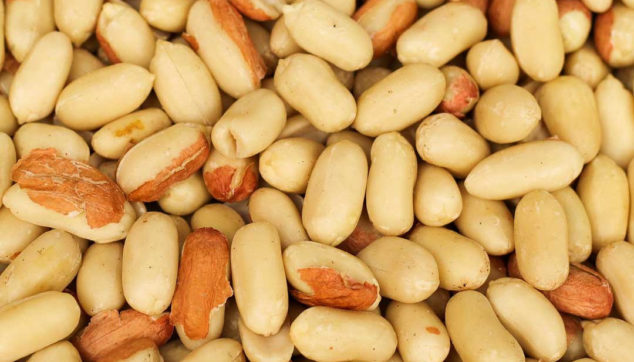
Peanuts are safe for dogs in small amounts; unsalted and either raw or roasted. Peanuts are technically a legume and not a nut.
Do not feed your dog peanut shells. The shells can tear tissue as they move through a dog’s digestive system.
Peanut allergies in dogs do exist but are not as frequent or life-threatening as in humans.
Are peanuts good for dogs?
Peanuts are loaded with protein, healthy fats, niacin, vitamin B-6, and vitamin E. They are a protein-rich snack but should be limited because of the extra calories and potential risk for pancreatitis.
Can Dogs Eat Peanut Butter?
Dogs can have small amounts of peanut butter. Note peanut butter is very high in fat and too much may cause pancreatitis.
Choose all-natural, unsweetened, and unsalted varieties. Make sure it does not contain artificial sweeteners. Look at the ingredients thoroughly.
Xylitol, a sweetener, is highly toxic to dogs and causes severe insulin release when ingested by dogs. Acute poisoning will occur, resulting in two main syndromes: hypoglycemia (life-threateningly low blood sugar) and acute hepatic necrosis (severe liver failure).
Take a look at this homemade peanut butter recipe with no added salt, sugar, or oil.
Is peanut butter good for dogs?
Just like peanuts, peanut butter is loaded with protein, healthy fats, niacin, vitamin B-6, and vitamin E. It is a protein-rich snack but should be limited because of the extra calories and potential risk for pancreatitis.
Can puppies eat peanut butter?
Yes, it is safe for puppies to have peanut butter. Put a small amount inside a Kong toy to keep a puppy occupied and satisfy a puppy’s chewing desire when teething.
Can Dogs Eat Pecans?

Pecans are harmful to dogs. Pecans contain the toxin juglone and can also contain aflatoxin. Juglone can cause gastric intestinal upset. Aflatoxin can cause liver damage.
Pecans can cause a gastric intestinal obstruction.
Can Dogs Eat Pine Nuts?
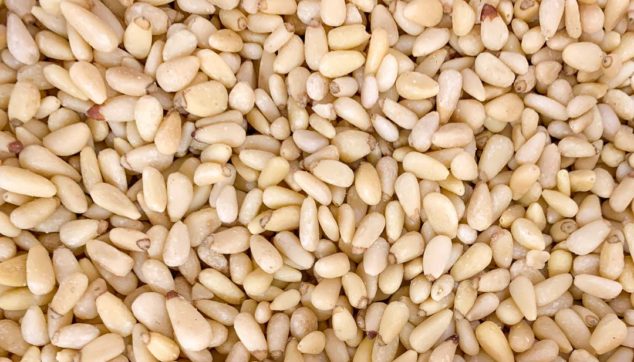
Pine nuts are not toxic however they are high in fat and can irritate your dog’s stomach. Too much fat in your dog’s diet can cause pancreatitis.
Pine nuts are high in phosphorus which can lead to urinary tract complications.
Can Dogs Eat Pistachios?
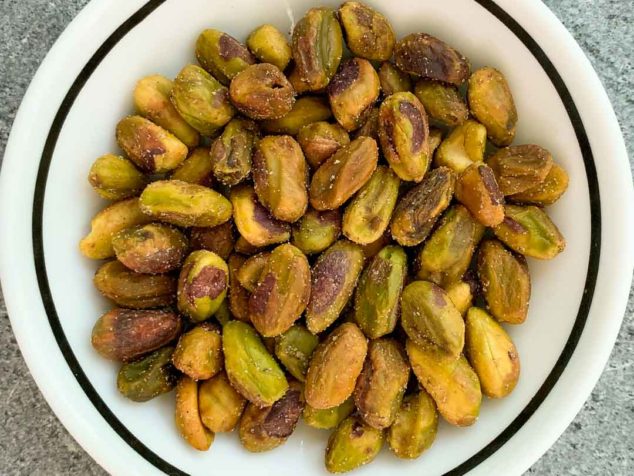
Yes, but pistachios should be avoided. Only give your dog shelled pistachios in small amounts.
While not toxic, pistachios are high in fat and can cause your dog to have an upset stomach and pancreatitis.
Pistachios pose a choking risk and can cause digestive blockages.
Pistachio shells can tear tissue as they move through a dog’s digestive system.
Pistachios can carry aspergillus mold that produces aflatoxin and can cause liver damage.
Are pistachios bad for dogs?
While pistachio nuts are high in protein and fiber, and one of the most vitamin B6-rich foods around, they are bad for dogs. The extra fat, calories, and potential risks make pistachios not good for dogs to eat.
Can Dogs Eat Walnuts?
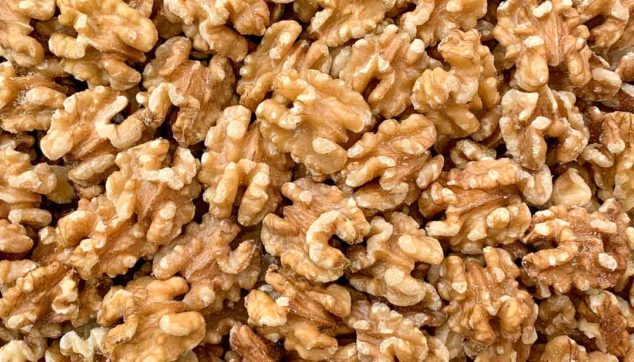
Walnuts are harmful to dogs. English and black walnuts contain the toxin juglone which can cause gastric intestinal upset.
Walnuts may also contain tremorgenic mycotoxins that can cause seizures or other neurological problems.
Walnuts can cause intestinal blockage.
Are walnuts bad for dogs? Absolutely. Do not take a chance of poisoning your dog with walnuts.
Salted, Sugared, and Flavored Nuts
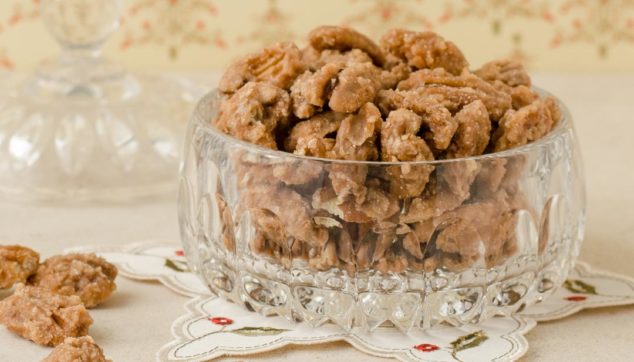
Never give your dog salted, sugared, or flavored nuts. The same applies to any nut butter. Always check ingredients because Xylitol is toxic and can be lethal to dogs.
Never give your dog nuts coated in chocolate. Chocolate is toxic to dogs and can be fatal if large quantities are consumed.
The Bottom Line on Nuts and Dogs
Should you give nuts to your dog? Nope. It’s not worth taking the chance of choking, intestinal blockage, or any of the risks associated with giving dogs nuts to eat. Feed your dog healthy foods instead.
Contact your veterinarian immediately if your dog has eaten any harmful nuts.
It’s important to ensure a safe and healthy life for your dog. Take a look at 15 Best Ways to be a Responsible Dog Owner.
Additional Resources:
Take a look at these great articles on fruits and vegetables for dogs:
📌 Pin this to save and share 📌
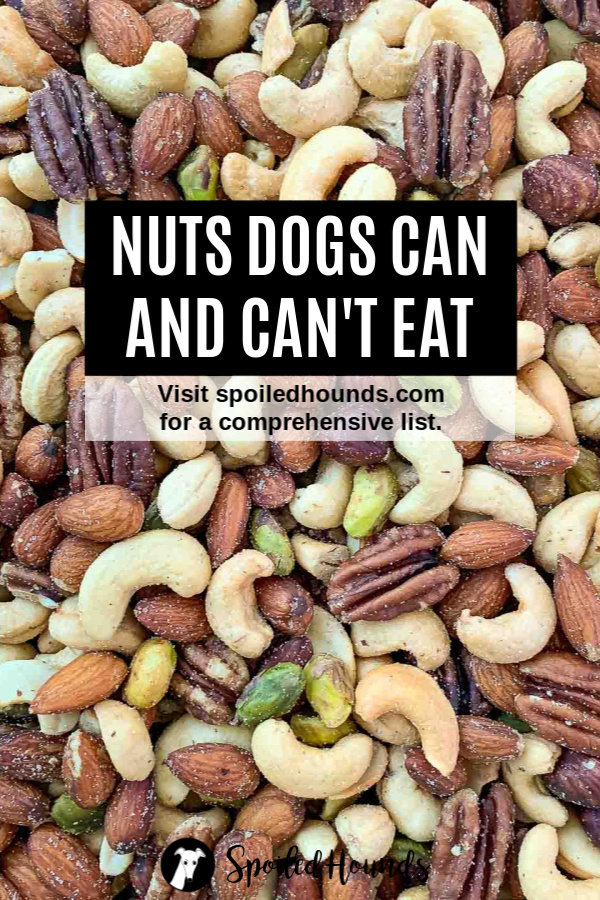
Cookie gets peanuts, peanut butter, and some almonds. One of her integrative veterinarians actually recommended almonds for her.
For peanut butter, I make sure I buy one that has a single ingredient: peanuts.
The consistency sucks and I have to chill it to be able to use it but I know it only has good stuff in it.
Great article Renee!
Acorns can be a big issue for some dog owners in the fall. Just keeping you pup from snacking on what is already on the ground can be challenging.
Here’s a short writeup on some ways to prevent your dog from eating acorns during the fall months when the are everywhere! https://goldenretrieverlove.com/is-it-safe-for-my-dog-to-eat-acorns/
it would be nice if you would make a list that we could print out on what’s poisonous and what is ok to give a dog
Great suggestion! Thank you.
Glad I found you. I had so many questions that have now been answered. I joined your tribe and cannot wait to learn more for my Lily Bean who is a Schnauzer. Thank you.
Hi
So happy to have found you. I had so many questions that have now been answered. I joined your tribe and cannot wait to learn more for my Lilybean who is a Schnauzer.
Thank you,
elvira
Cookie’s diet includes peanuts, peanut butter, and even some almonds, which were recommended by one of her integrative veterinarians. When buying peanut butter, I ensure that it only contains one ingredient: peanuts. Although the consistency is not the best and I have to chill it before use, I feel good knowing that it contains only wholesome ingredients.